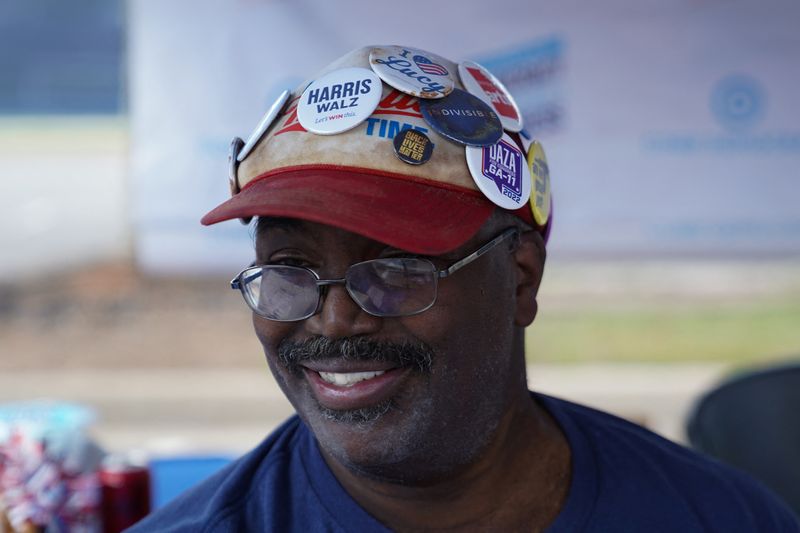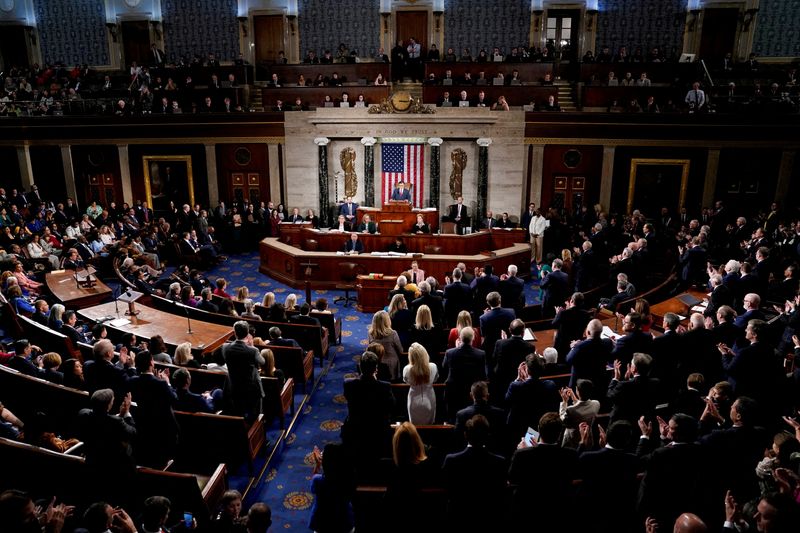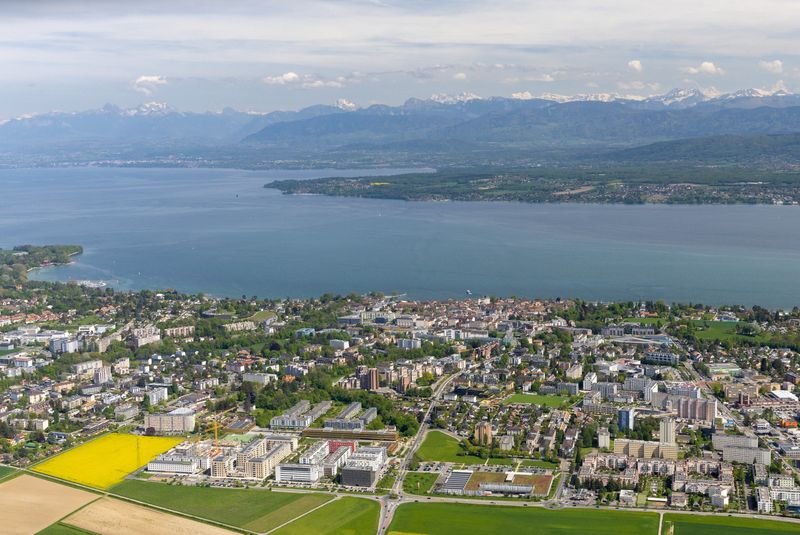By Tim Reid and James Oliphant
VALDOSTA, Georgia (Reuters) -Vivian Childs, a staunch supporter of Donald Trump, schooled a roomful of Republicans on how to win over Black voters in the battleground state of Georgia.
Focus on Trump’s economic policies, on illegal immigration and inflation, the Black Baptist minister told the gathered group of volunteers and campaign staff at the former president’s newly opened office in the rural city of Valdosta last month.
Tell voters what Trump has done for them and that he will bring the change America needs, she exhorted. “We are the party of hope,” she said. “We are the party of truth.”
There was a mood of urgency at the office, a grand building with white pillars and porches. By Trump’s own admission, Georgia has become a must-win state, one he thought he had locked up until Kamala Harris became his Democratic rival in July.
Her late entry ignited a burst of popular enthusiasm, and opinion polls in Georgia show the candidates neck and neck, a huge turnaround from early July when polls showed Trump leading Democratic President Joe Biden by as many as six percentage points.
In particular, an intense battle is being waged for the Black voters who make up a third of the state’s population, the biggest proportion of Black voters in any of the seven battleground states that will decide the Nov. 5 presidential election.
Trump’s attempt to pull in more Black support, however, is complicated by their traditional loyalty to the Democratic Party, his past racist remarks and a history of Republican-backed voting restrictions that activists say make it harder for Black residents to vote. Republicans deny they are trying to suppress the vote.
Childs, part of the national “Black Americans for Trump” coalition of advocates, conceded the nomination of Harris initially changed the race in Georgia. “There was a lot of excitement, absolutely,” she said. “She’s Black and a woman.”
She insisted that excitement was fading.
“We have got to stop dividing our country based on how we look,” she added. “I’m telling people to talk to Black people the same way they talk to white people: look at President Trump’s resume, his policies, what he’s done for all Americans.”
Reuters spoke to three dozen campaign officials, party chairs, local activist groups and allies working on behalf of Trump and Harris to get a sense of each candidate’s operation in the closely fought state that Trump lost to Biden by fewer than 12,000 votes in the 2020 election.
A senior Trump campaign official, who requested anonymity to discuss confidential matters, said the team saw particular promise in attracting young Black men who he said have become disaffected with Democrats over high prices and see greater economic opportunities under the former president.
PIGS, PEACHES AND POLITICS
In churches and county fairs, on doorsteps and social media, and across the airwaves, both campaigns are courting Black people, a voting bloc that has traditionally leaned heavily Democratic but where Trump has been making gains, according to opinion polls.
“It has gotten really intense in Georgia,” said Essence Johnson, a Black woman who chairs the Democratic Party in Cobb County, a sprawling region outside of Atlanta.
Indeed, at the Pig and Peaches barbecue festival in Cobb County, battle lines were drawn.
The Democratic stall courted voters of color with literature on student loan forgiveness, help for historically Black universities and lowering drug prices. The Republican stall, a hundred yards away, was replete with Spanish-language leaflets and literature focused on inflation, abortion, economic opportunity and faith.
“A lot of African Americans, Asians and Hispanics have these shared values,” said Salleigh Grubbs, the Republican county chair, who has been organizing events at schools in the more racially diverse southern part of the county, holding house parties and door knocking in predominately Black neighborhoods.
Cobb County illustrates the demographic changes that have transformed Georgia from a reliably Republican state into a battleground. Once a predominately white, Republican county, it’s now 30% Black, 14% Hispanic and 6% Asian, an area that helped Biden win Georgia in 2020.
Johnson, the Cobb County Democratic chair, said Harris’ entry in the race had shifted things dramatically. “It’s a reflection in the mirror for a lot of us,” she said of Harris.
A Black men’s forum held just before Biden ended his reelection bid on July 21 drew 14 attendees, she said, but 125 people showed up for another held just after Harris entered the race. Sixty people marked a good crowd at county party meetings when Biden was the candidate; 235 people attended once Harris became the nominee.
Before Biden dropped out, Trump’s campaign was so confident of victory in Georgia that it had spent less than $3 million on ad buys. Since Harris’ emergence, the campaign and an affiliated group responded by sinking more than $30 million into advertising in the state, outspending the Harris campaign through the month of August.
Both sides have committed to spending more than $37 million each in Georgia through Election Day, according to AdImpact, a firm that tracks political advertising.
The Georgia Black Republican Council, which has endorsed Trump, is launching ads on Black radio stations in eight metro areas, focused on immigration, the economy and opposition to abortion, said Camilla J. Moore, the council’s chair.
Ads from the Trump campaign are mostly negative, attacking Harris for inflation, blaming her for people crossing the U.S.-Mexico border illegally and accusing her of being a dangerous liberal.
Janiyah Thomas, Black media director at the Trump campaign, said the former president had a proven track record of creating opportunities for the Black community.
“To every Black American struggling to make ends meet, our message is clear: vote for the candidate who has consistently delivered on promises,” she added.
In August and September 2019, while Trump was president, the Black unemployment rate reached a new low of 5.3%. Under Biden, the rate fell even lower, to 4.8%, in 2023.
Harris is running ads focused on proposals to lower drug prices, taxing large corporations and the ultra-wealthy to pay for housing, and tax breaks for working parents.
Harris’ campaign said it had been reaching out to Black voters across Georgia “since day one.”
“Vice President Harris is fighting to lower costs for our families, protect our freedoms and make sure everyone in Georgia can not just get by, but get ahead,” added Porsha White, the campaign’s state director.
‘GOD HELP OUR SOULS’
Trump took about 11% of the Black vote in Georgia in the 2020 election, according to exit polls. If he were to pull in any higher share in November, he could win the state, said Andra Gillespie, a political science professor at Emory University.
A poll conducted for CNN during the last week of August showed Harris with a one-percentage-point lead in the state, 48%-47%, with Trump getting 10% of the Black vote.
A Trump victory in Georgia would relieve pressure for him to win all three of the midwestern battleground states, Michigan, Pennsylvania and Wisconsin. But he risks alienating some voters with his inflammatory comments about Harris, a woman of Black and South Asian heritage. Trump has questioned the vice president’s racial identity.
“God help our souls if Trump wins the election,” said Demetrious Hall Sr., 62, a Black voter in Savannah who decried Trump’s racist rhetoric and said he was voting for Harris.
Trump’s ally Childs brushed off those remarks in an interview after the Valdosta volunteer meeting, citing his economic policies that she said reduced Black unemployment, his help for historically Black colleges and universities, and his clampdown on illegal immigration as reasons to support him.
Asked how she responds to voters who claim Trump is racist, Childs said: “I say, ‘Based on what?'”
Georgia’s governor, Brian Kemp, showed that a Republican can increase his share of the Black vote in 2022, when he beat a Black Democrat, Stacey Abrams, in part because support from Black voters jumped 7 percentage points from their first match-up in 2018. Kemp focused on the economy and gun rights, said his former campaign manager, Bobby Saparow.
Bruce LeVell, a Black businessman from Atlanta, said Trump’s message on pocketbook issues resonated with voters of color.
“Black men especially and some of the women are really taking a look at their wallets,” said LeVell, who hosted a roundtable of Black business owners with Trump when he visited Atlanta in early August.
At the Embassy church in Austell in southern Cobb County, meanwhile, senior pastor B. Dwayne Hardin is also spreading the gospel of conservatism.
At a recent service kicked off with an hour of boisterous gospel songs, Hardin told his Black congregation that America is heading towards socialism, that children are being indoctrinated in schools and the country “is full of terrorists.”
He said it was important to vote for people who “shake things up.”

Afterwards, in his private office, Hardin said he doesn’t tell people to vote for Trump, but that Trump is on the right side of the issues such as individual liberty, school choice and economic empowerment.
“Do not worship the idol of skin color,” he said he tells his flock.










